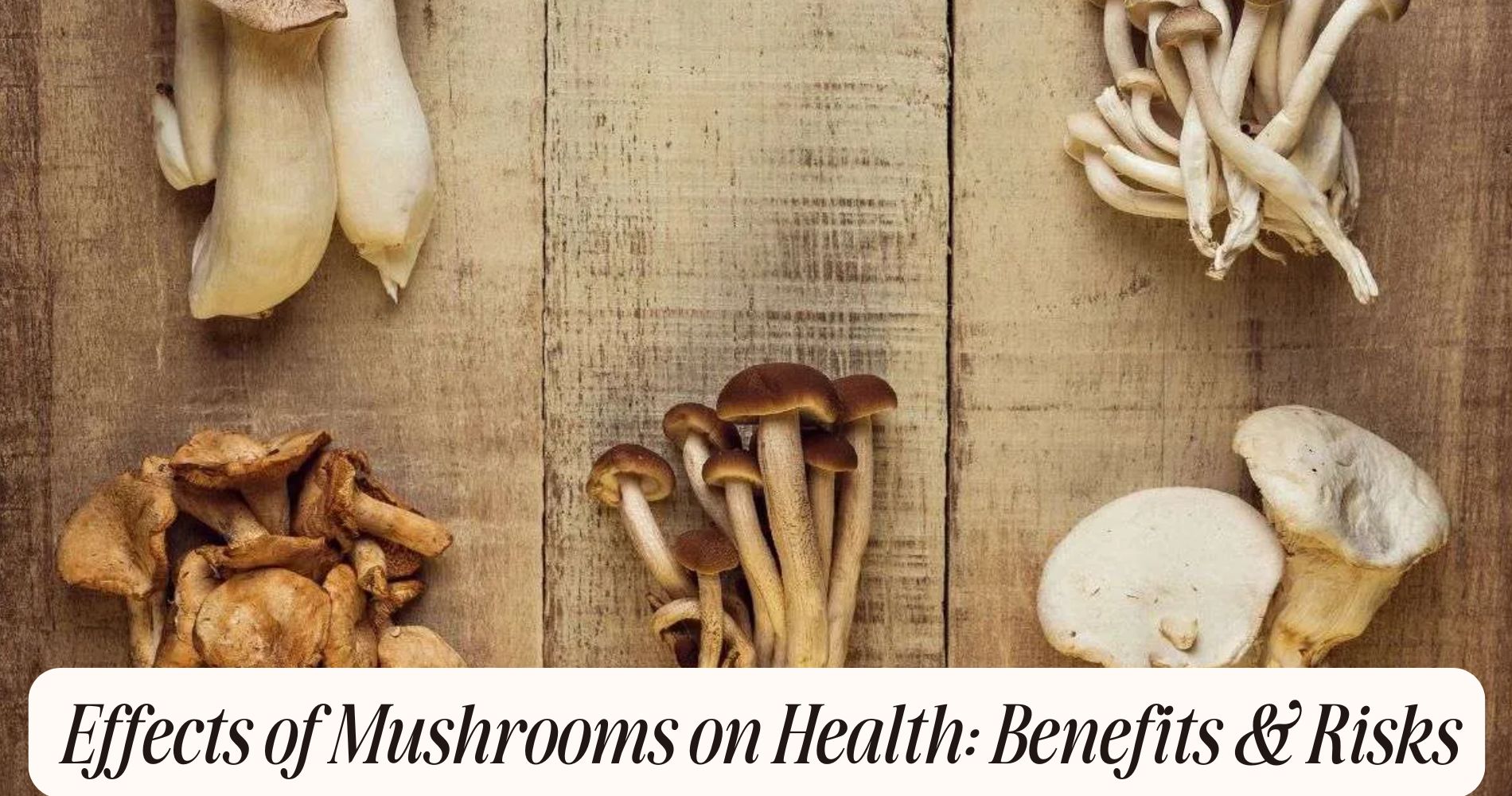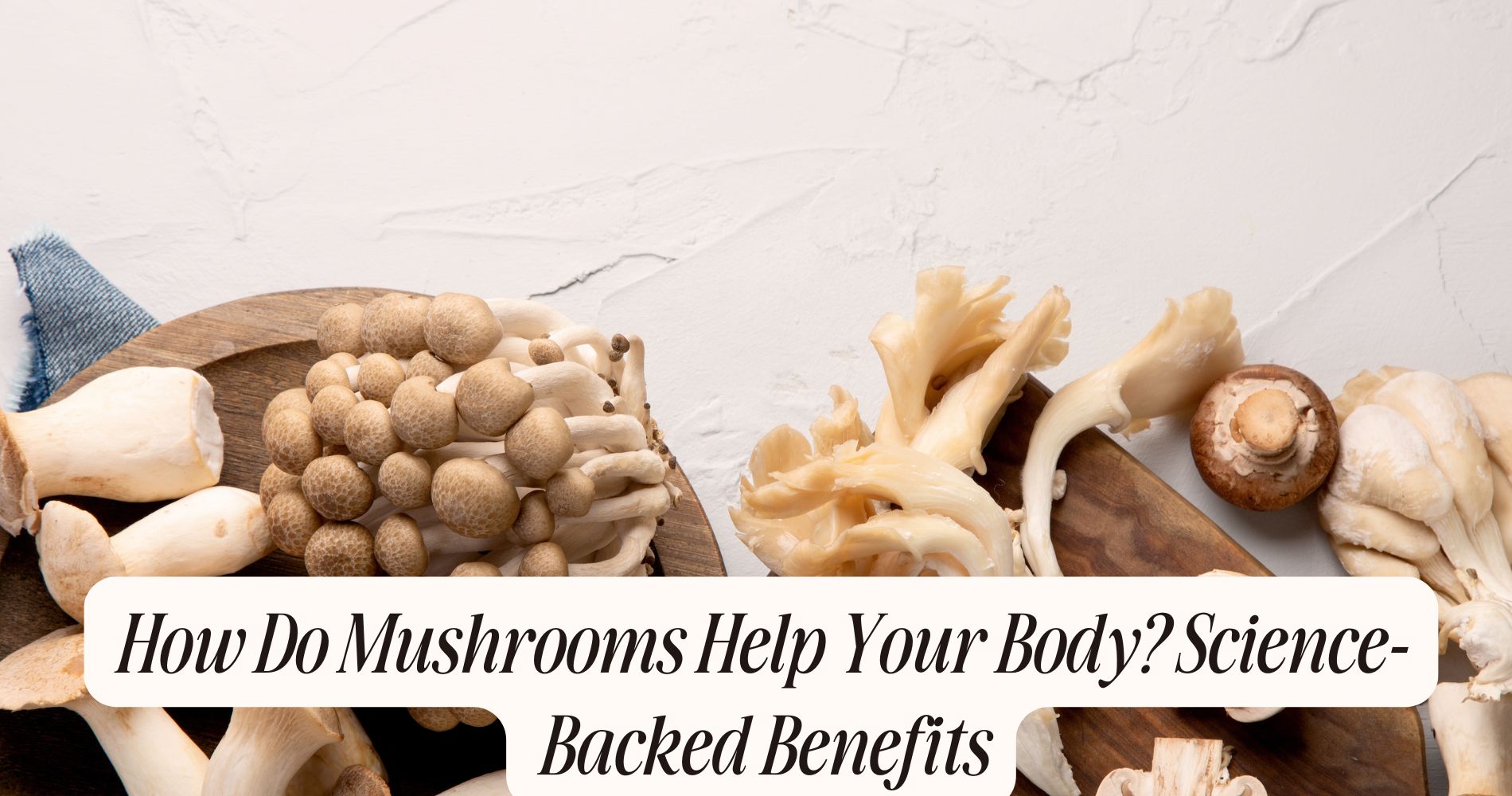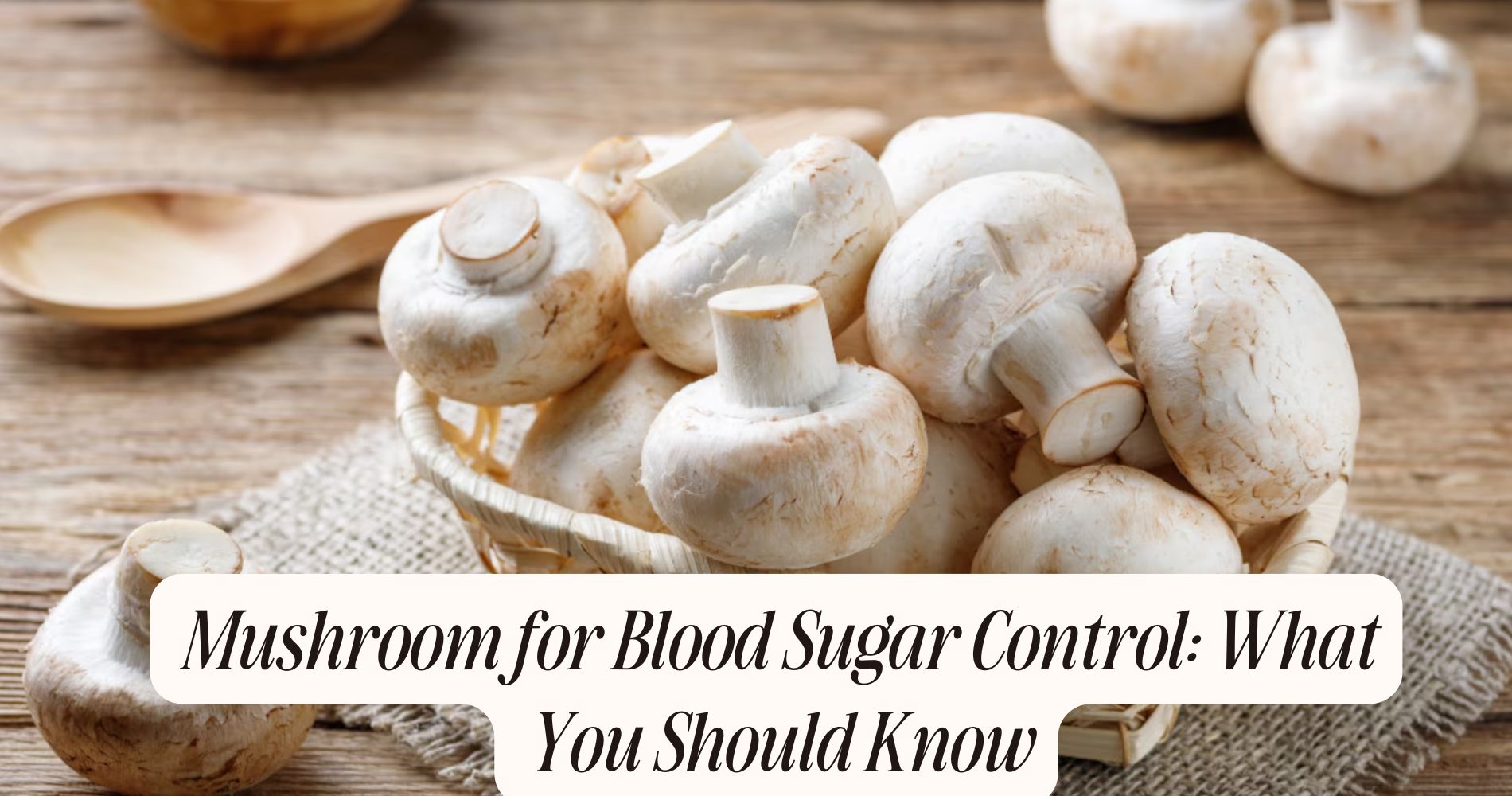
Effects of Mushrooms on Health: Benefits & Risks
Mushrooms have a wide range of health effects, providing essential vitamins, minerals, and antioxidants that support overall well-being. Rich in B vitamins, selenium, and dietary fiber, they help boost immune function through beta-glucans and polysaccharides. Research also highlights the effects of mushrooms on mental health, with some varieties showing promise in reducing stress and supporting cognitive function. However, proper consumption is crucial, as some mushrooms carry risks if not prepared correctly. Explore more about their benefits and considerations to make the most of these nutrient-packed fungi.
Nutritional Profile of Mushrooms
When you explore the nutritional profile of mushrooms, you'll find they're a powerhouse of essential nutrients. Different mushroom varieties like shiitake, portobello, and cremini boast a remarkable nutritional density.

These fungi are low in calories yet rich in vitamins and minerals, including B-vitamins, selenium, and copper. Clinical studies highlight their significant protein content, making them an excellent alternative for vegetarians.
Mushrooms are also a source of dietary fiber, which supports digestive health. Research demonstrates that their nutrient composition may contribute to improved metabolic function.
The bioactive compounds in mushrooms, such as polysaccharides and antioxidants, further enhance their nutritional value. By incorporating a variety of mushrooms into your diet, you can leverage their diverse nutritional benefits to support overall health.
Immune System Support
Although often overlooked, mushrooms play an essential role in bolstering the immune system. Various mushroom varieties, like shiitake, maitake, and reishi, are renowned immune boosters.
Research indicates that these mushrooms contain polysaccharides, particularly beta-glucans, which enhance your immune response. Beta-glucans stimulate white blood cells, key players in fighting infections and diseases. Clinical studies have shown that regular consumption of these mushroom varieties can lead to improved immune function and increased resistance to pathogens.
Moreover, mushrooms are rich in essential nutrients such as selenium and vitamin D, which further support immune health.
Incorporating mushrooms into your diet provides a natural way to fortify your body's defenses. By leveraging the unique properties of these fungi, you actively contribute to maintaining a robust immune system.
Potential Antioxidant Properties
While mushrooms are celebrated for their immune-boosting qualities, they're also potential powerhouses of antioxidants. Research shows that mushrooms contain various antioxidant compounds, like ergothioneine and glutathione, which can help combat oxidative stress.
Oxidative stress occurs when there's an imbalance between free radicals and antioxidants in your body, potentially leading to chronic diseases. By consuming mushrooms, you may bolster your body's ability to neutralize free radicals.
Clinical studies highlight that mushrooms, particularly varieties such as shiitake and maitake, have significant antioxidant activity. This activity is essential in reducing the risk of cellular damage and supporting overall health.

Including mushrooms in your diet could consequently play a role in safeguarding cells and tissues from oxidative damage, contributing to long-term wellness and vitality.
Role in Mental Health
Beyond their antioxidant properties, mushrooms also play a fascinating role in supporting mental health. Recent psilocybin research highlights promising effects on mood disorders, such as depression and anxiety.
Psilocybin, a compound found in certain mushrooms, can facilitate profound changes in perception and emotional processing. Clinical trials have demonstrated that mushroom therapy may lead to significant improvements in well-being and mood stability.
For example, a study published in "JAMA Psychiatry" reported that psilocybin-assisted therapy resulted in rapid and sustained reduction in depressive symptoms.
You'll find that the controlled use of psilocybin in therapeutic settings offers a novel approach to mental health treatment. As research advances, the potential of mushroom therapy continues to unfold, providing hope for those seeking alternative mental health interventions.
Considerations for Safe Consumption
When considering the safe consumption of mushrooms, it's important to understand the variations in their chemical compositions and effects. Different species can contain compounds with diverse bioactivities, necessitating precise dosage guidelines.
For instance, some mushrooms harbor psychoactive substances that require careful regulation to avoid adverse effects. You should always follow established dosage guidelines, which are often based on clinical research and expert recommendations.

Proper preparation methods are equally vital. Cooking techniques, such as boiling or sautéing, can deactivate potentially harmful compounds and enhance nutritional content.
It's crucial to source mushrooms from reputable suppliers to guarantee they've been correctly identified and processed. This vigilance helps mitigate risks associated with misidentification or contamination, ensuring that you can enjoy their benefits safely.
Allergic Reactions and Sensitivities
Although mushrooms are a nutritious and versatile food, they can trigger allergic reactions and sensitivities in some individuals. If you've experienced mushroom allergies, you might notice symptoms such as itching, swelling, or respiratory issues.
Sensitivity symptoms often include gastrointestinal discomfort, skin rashes, or headaches. In clinical practice, these reactions are relatively rare but can be significant.
It's important to distinguish between an allergy and a sensitivity; allergies involve the immune system, while sensitivities might not. Research indicates that certain proteins in mushrooms can act as allergens, prompting your body to react defensively.
If you suspect you're reacting to mushrooms, consider an allergy test. Identifying the specific mushroom or component causing your symptoms is essential for managing your health effectively.
Effects on Gut Health
While some individuals may need to be cautious about allergies or sensitivities, mushrooms offer notable benefits for gut health. They possess prebiotic effects, which are essential for fostering a healthy microbiome balance.
Prebiotics are non-digestible fibers that feed beneficial gut bacteria, promoting their growth and activity. By incorporating mushrooms into your diet, you can enhance your gut microbiota's diversity and resilience.
Studies have shown that diverse microbiomes are linked to improved digestion, better immune function, and reduced inflammation. Certain mushroom varieties, like shiitake and maitake, are particularly effective in this regard.

Clinical insights suggest that these mushrooms contain specific polysaccharides that support the proliferation of gut-friendly bacteria, contributing to an overall balanced and healthy gut environment.
Culinary Uses and Versatility
Mushrooms offer an impressive range of culinary uses and versatility that make them a staple in many kitchens worldwide. Their unique ability to absorb and enhance flavors is well-documented, providing chefs with numerous cooking techniques to explore.
Whether you're sautéing, grilling, or roasting, mushrooms adapt seamlessly, delivering depth to any dish. Research highlights their compatibility with diverse flavor pairings, such as garlic, thyme, and soy sauce, optimizing taste profiles in both vegetarian and meat-based recipes.
Clinical insights reveal that their umami-rich content not only elevates flavor but also reduces the need for additional salt, supporting healthier cooking practices.
Experience the Benefits of 10 Functional Mushrooms with SUPER MUSHROOM GUMMIES
Want to enjoy the health benefits of mushrooms in the easiest, tastiest way possible? SUPER MUSHROOM GUMMIES by Well Gummies pack the power of 10 functional mushrooms into a delicious, convenient chew. These vegan-friendly gummies enhance focus, boost energy, and support immunity—all without jitters or crashes. Plus, they taste like fresh wild berries, making wellness feel like a treat! Get all the goodness of mushrooms without the prep—try them today!
Frequently Asked Questions
Can Mushrooms Be Used in Natural Skincare Products?
You're wondering if mushrooms can be used in natural skincare products. Research indicates mushroom extracts offer skincare benefits, such as anti-inflammatory and antioxidant properties. Clinical insights suggest they help improve skin texture and reduce signs of aging effectively.
Do Mushrooms Have Any Aphrodisiac Properties?
You might wonder if mushroom varieties possess aphrodisiac properties. While some claim benefits, scientific evidence remains limited. Certain mushrooms offer health benefits, but clinical insights don't conclusively support their use as aphrodisiacs. Always consult reliable studies.
Are There Any Mushrooms Useful for Pest Control?
You're wondering if mushrooms can help with pest control. Research shows mushroom pesticides, like certain fungi deterrents, effectively manage pests. Specific fungi, such as Metarhizium, target insects, offering a natural, eco-friendly solution for pest management.
Can Mushrooms Aid in Environmental Cleanup?
Yes, you can use mushroom mycoremediation for environmental cleanup. Fungal bioremediation processes break down pollutants like hydrocarbons and heavy metals. Studies show mushrooms' enzymatic systems effectively degrade contaminants, offering a sustainable method for restoring polluted ecosystems.
How Do Mushrooms Impact Sustainable Farming Practices?
Mushroom cultivation enhances sustainable farming by improving soil quality and reducing waste. In organic farming, mushrooms decompose organic matter, releasing nutrients and promoting biodiversity. Studies show they support soil health, making farming more resilient and eco-friendly.
Conclusion
You've explored how mushrooms offer numerous health benefits, from bolstering your immune system to potentially enhancing mental well-being. Their rich nutritional profile and antioxidant properties make them a valuable addition to your diet. However, it's vital to consume them safely, being mindful of potential allergies or sensitivities. While their effects on gut health are promising, always guarantee proper preparation. With their culinary versatility, mushrooms can be both a delicious and healthful choice for you.




